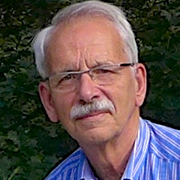
Professor Jaap Van Den Berg
University Project Leader
The development of the technology – currently being patented – is a research collaboration between the University and Huddersfield firm Reliance Precision which will development intricate, high-strength components for the aerospace industry and medical implants among others.
A £2 million-plus research collaboration between University of Huddersfield scientists and a leading specialist engineering firm will add a whole new dimension to 3D printing.
Intricate, high-strength components for the aerospace industry and medical implants are among the products that could be made more speedily and economically as a result of research that aims to harness the potential of particle beams during additive manufacturing (AM), as 3D printing is known.
The Huddersfield company Reliance Precision has teamed up with the University of Huddersfield’s Professor Jaap Van Den Berg – whose specialities include ion beam technology – for two successive projects that have earned funding from the official body, Innovate UK.
These projects have been key elements of Reliance’s overall programme to develop a new generation of electron beam additive manufacturing (EBAM) machines that will enable much wider adoption of this form of 3D printing, in which metal powder is placed under a vacuum and fused together by heat from a high-energy electron beam. It is a technique that enables the production of highly complex components, building them up layer by layer.
The first Innovate UK-funded project undertaken by Reliance and Professor Jaap Van Den Berg was named RAMP-UP, (which stands for Reliable Additive Manufacturing technology offering higher Productivity and Performance). It was awarded £1.4 million. This has now successfully concluded and led to the development of technology – currently being patented – that greatly reduces the need for the powder used during AM to undergo a time-consuming and costly process of preparation known as pre-sintering.
The success of RAMP-UP has meant that it has been immediately followed by a fresh collaboration between Reliance and Professor Van Den Berg. It receives funding of £850,000 and is named INSPIRE.
The goal for the new two-year programme is to make pre-sintering completely unnecessary and enable metal powder to be recycled and reused by an EBAM system. This will mean the technology becomes more economic and productive and therefore more widely adopted, fully realising its potential. This will be a major boon for the high-value manufacturing sector and Professor Van Den Berg envisages that when the technology is more widely available it will find new uses in a wide variety of sectors.
At the University of Huddersfield’s Ion Beam Centre – home to the world-class Medium Energy Ion Scattering (MEIS) facility – Professor Van Den Berg will work on INSPIRE with Research Fellow Dr Andrew Rossall. It is also intended to appoint a new Research Fellow to replace Dr Martyn Hussey who as the Research Fellow on the RAMP-UP project was instrumental in the development and has now joined the team at Reliance.
Professor Van Den Berg took charge of the relocation and upgrading of MEIS when it came to the University of Huddersfield from its former base at the Science and Technology Facilities Council’s laboratory in Daresbury. For the INSPIRE project, he will use his expertise in particle beam transport and convert an existing experimental system within the MEIS lab for the R&D work envisaged.
More news
£1m initiative for scalp cooling research centre
The University will join with pioneering technology company PAXMAN to create the new PAXMAN Scalp Cooling Research Centre
£3.5m railway test rig for pantograph research
The pantograph test rig will sit alongside the Institute’s current £4.5m test rig designed to evaluate vehicular and tracks systems
Prof chosen for EPSRC’s Strategic Advisory Network
Professor Dame Xiangqian Jiang is selected as a strategic advisor to Engineering and Physical Sciences Research Council Executive
